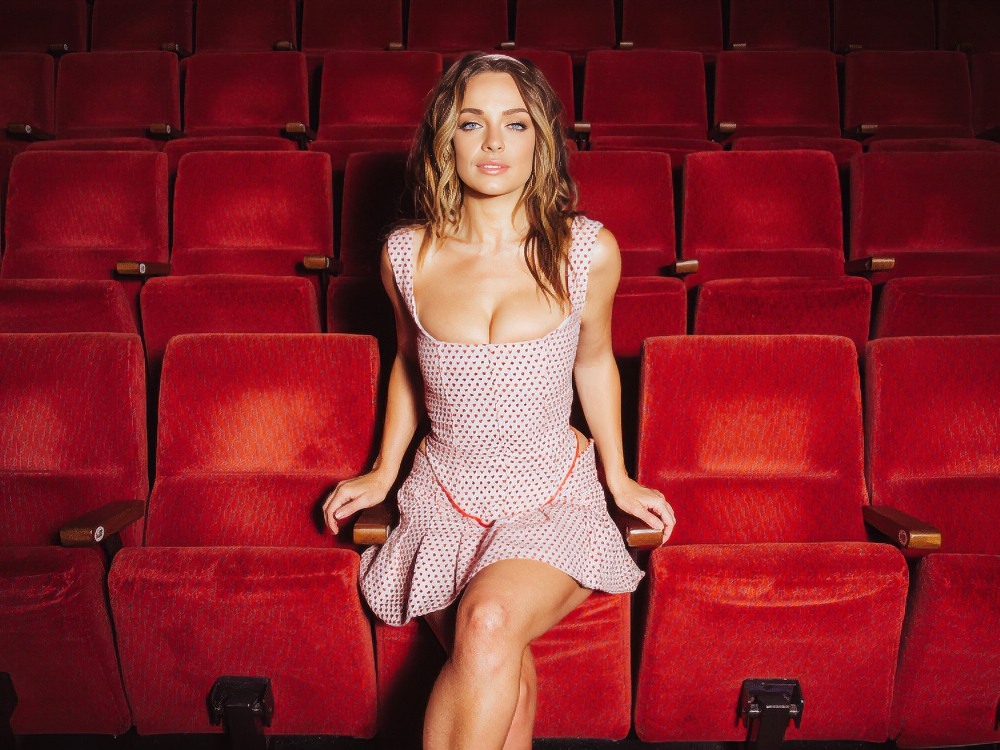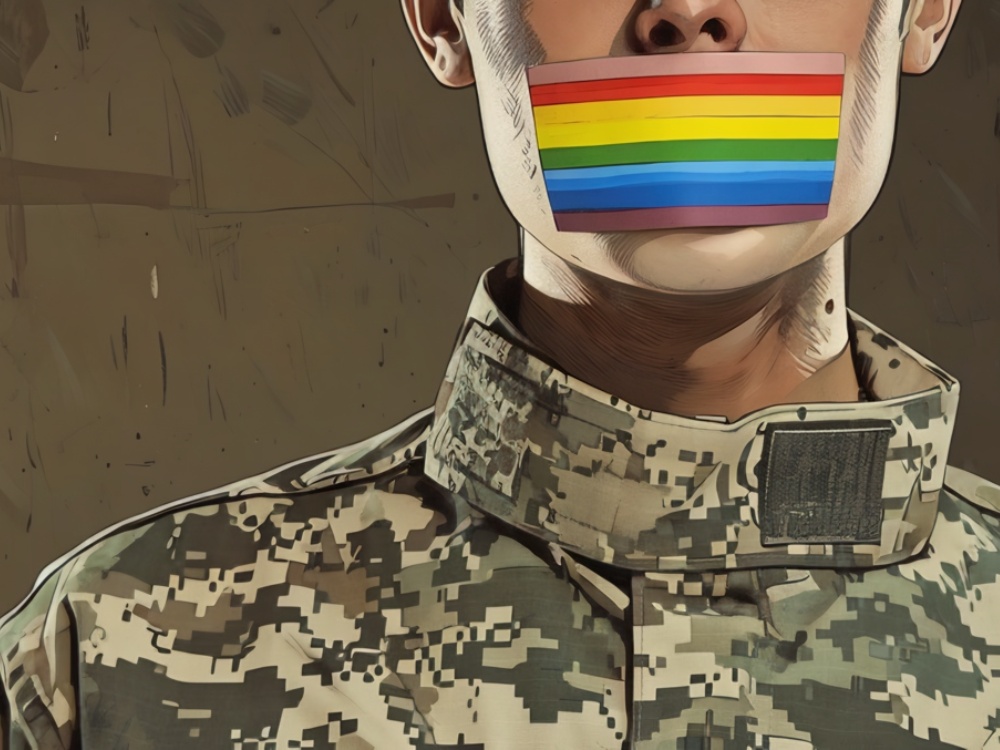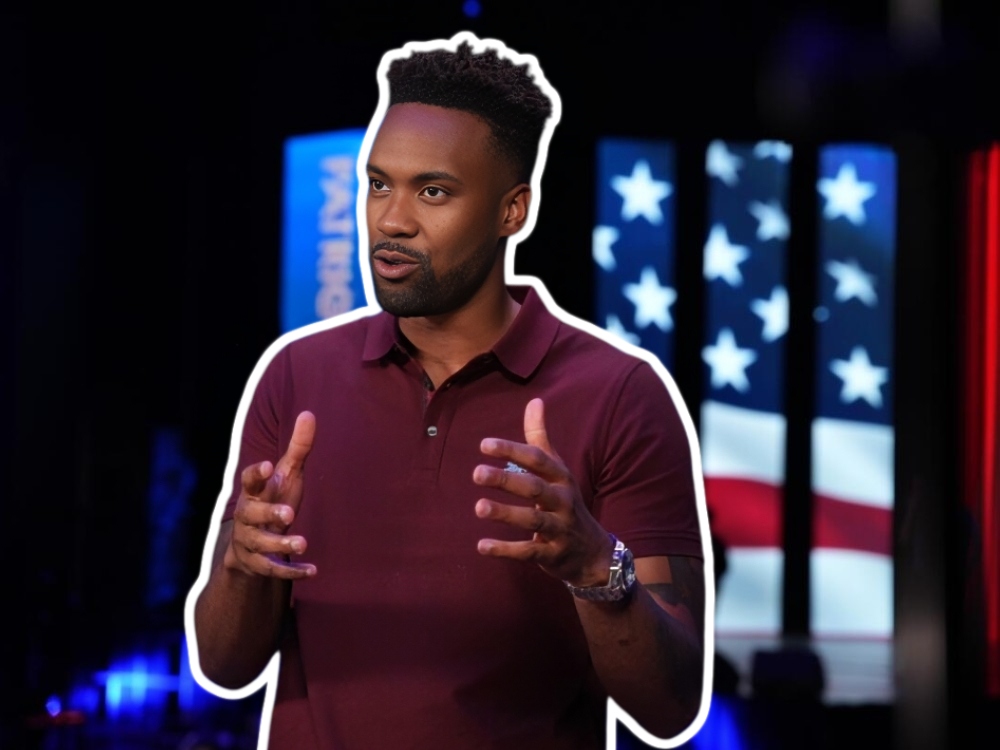Abbie Chatfield talks to Oliver Hall about bi-erasure, online trolling, feminism, and a career built on always saying what she really thinks.
There’s a raw intimacy in seeing Abbie Chatfield sitting alone, framed by rows of empty crimson seats. It’s a striking image that reflects the essence of her public life: defiant, vulnerable, and unapologetically herself. Owning her space and inviting others to share it.
The podcaster has never shied away from honesty in her public life and is frank about the complexities of her sexuality.
“An unfinished part of my life”
“I get offered a lot of ‘queer’ jobs, like hosting Mardi Gras, but being in a straight-presenting relationship, I always decline, because I don’t feel it’s right to take opportunities from people who are more marginalised than I am,” she says.
She names the paradox, she’s openly bisexual but in a relationship with musician Adam Hyde, who is straight. For Abbie, it means acknowledging straight privilege while still holding onto her identity. “I am bisexual, but I don’t want to take up too much space in queer media as a white, cis woman dating a cis, straight man.”
Her personal journey has been marked by frustration. Growing up in Brisbane, she says back then queer culture was scarce. “If you were queer, you moved away. There was one mega club, The Beat, which, as a ‘baby bi’ trying to explore, was intimidating.”
Moving to Sydney should have offered new opportunities, but lockdowns interrupted. Then came the sting of rejection online. “Now I’m banned from dating apps because people recognise my picture and report my profile as fake. So circumstances have limited how much I could explore that side of myself, and it still feels like an unfinished part of my life.”
And then there’s the sting of bi-erasure. “I’ve been told I’m ‘queer-baiting’ because I haven’t had a relationship with a woman,” she says. While Abbie believes conversations about representation are important, she also warns against letting them be weaponised. “The bigger threat is from patriarchal, heteronormative society, and how it can capitalise on perceived infighting (within LGBTQ+ communities). Right now, with global conservative pushback, we need unity.”
Comedy, Catharsis, and The Trauma Dump Tour
On tour, Abbie transforms vulnerability into humour. The Trauma Dump Tour is a two-hour solo show featuring a PowerPoint, no script, and plenty of improvisation, an approach that works with her ADHD rather than against it.
The show revolves around three of her worst dating disasters. One story is funny, another absurd, and one deeply heavy, with a trigger warning for abuse. “I hope people walk away learning from my mistakes,” she tells us.
“Now I’m in a very happy relationship with Adam, I’ve added more lessons of encouragement to notice red flags earlier, but still mainly comedy, kooky, funny, heartfelt stories that I haven’t told anywhere else, mainly to avoid being sued!”
The Weight of the “Feminist” Label
Public discourse has painted Abbie as a feminist figurehead, something she resists. “Sometimes people call me a feminist, then get mad at me for ‘thinking’ I am one. I’ve never claimed it, I’m just speaking my opinions.”
The harder part, she explains, is how conservative outlets weaponise the label. “Right-wing media use ‘feminist’ to generate hate clicks. People suggest I should just stop talking politics. I’m not trying to be controversial, I just share my thoughts.”
The disparity is sharp when compared to men in the same space. “Adam can post something as basic as ‘men shouldn’t hit women’ and be hailed as a feminist god. I love that he says it, but it’s frustrating to see the praise he gets while women saying the same, or less, get death threats.”
Surviving Social Media
Abbie has taken breaks from social media for her mental health, and she encourages others to do the same. “People say, ‘Don’t worry, they’re not real people,’ but it’s hard to believe that when you’re reading ‘shame, shame, shame’ in your DMs.”
TikTok, she says, is especially draining. “I took a month off and dreaded going back. Instagram feels slower, but TikTok’s constant heightened state can’t be good for mental health.”
Even short breaks help. “If you go viral, which is awful unless you’re used to attention, remember it’s all contained within your phone. Put it away for a week, and you can reset your nervous system.”
Rather than isolating when she’s struggling, she now makes an effort to connect with friends. “After COVID, it became too easy to call isolation ‘self-care’ when it often just makes things worse. Going for a walk with a friend or hearing about their bad date is better than sitting alone with your thoughts.”
Fighting Ideas, Not Individuals
When it comes to figures like Andrew Tate, Abbie admits she wavers between ignoring and responding. “At first, I thought we should ignore him to avoid giving him oxygen. But progressives are the minority, and there’s a global right-wing movement happening. Right now, I think it’s important to call things out, but focus on the ideas, not just the person.”
Her mantra is simple: “Attack the argument, not the individual.”
The Albanese Interview
A career milestone came in 2022 when Abbie interviewed Anthony Albanese ahead of the Australian election. It was one of his first interviews of the year, and she describes it as nerve-wracking. “There are policies of his I don’t agree with, but I wanted him to win over Peter Dutton. At the time, the Liberals were polling ahead, and there were no formal policies yet, just a swell of right-wing support.”
She wanted to hold him accountable while not damaging his chances. The gamble paid off. “I got thousands of DMs from people who had never voted before saying they learned something. My favourite feedback was from a friend’s dad, a lifelong Liberal voter in Queensland, who voted Labor because of that interview.”
Reality TV Slut-Shaming and Building a Career from It
Abbie first entered the public eye on The Bachelor, where she was given what she calls a “villain edit.” Her “crime” was being open about sex at 23. “The producers never made me mean, just confident and horny. But it was a culture shock. It made me realise how conservative Australia can be.”
Her edit was framed negatively, with “mean sexy” tones and even snake sound effects. Yet a year later, another contestant was given a fun, flirty edit for similar behaviour.
“That contrast made me more media savvy and less afraid to speak my mind,” she tells us. “People already hated me for things I didn’t think were wrong, so I figured I may as well say what I actually think.”
That defiant philosophy has become a career built on raw candour, sharp humour, and a refusal to be silenced. For Abbie, being unfiltered is no longer just survival, it’s her signature.


































